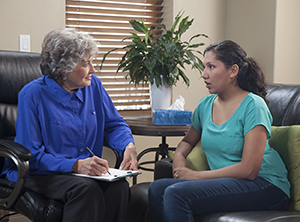A
B
C
D
E
F
G
H
I
J
K
L
M
N
O
P
Q
R
S
T
U
V
W
X
Y
Z
Click a letter to see a list of medical procedures beginning with that letter.
Click 'Back to Intro' to return to the beginning of this section.
Understanding Social Phobia (Social Anxiety Disorder)
You have to talk in a meeting. Just thinking about it makes your heart race. Your throat gets tight, and you can hardly breathe. You may even feel faint. Speaking in front of a group makes most people nervous, but you feel your fear is beyond reason. There is no reason to be ashamed of fear. You may have an anxiety disorder known as social phobia. Talk with your healthcare provider or mental health provider. They can give you treatment and support.

What is social phobia?
Social phobia is also called social anxiety disorder. It is an intense fear of being embarrassed in a social or work setting. Even if you realize that your worries are unreasonable, you still expect people to judge and think poorly of you. You may stay away from group settings so you don't have anxiety. This can create problems with relationships and your job. It can cause problems in other parts of your life. And it can make life much less enjoyable.
What causes it?
The exact cause of social phobia isn’t known. It may run in families. The balance of certain chemicals in your brain may play a role. And an embarrassing or traumatic event may trigger social phobias in some people. In some cases, the social phobia may not appear until years after this event.
How does social phobia feel?
People with social phobia are very conscious of how others see them. In a social setting, symptoms may include:
-
Very self-conscious thoughts
-
Shakiness, nervousness, or a trembling voice
-
Sweating and blushing
-
Increased heartbeat
-
Shortness of breath
-
Headache or stomachache
-
Muscle tension
-
Dry mouth
Getting help
Asking for help may be hard, but can make you feel better. Kinds of help include:
-
Medicines. These may help lessen your symptoms.
-
Behavioral therapy. This can help you manage your fears. This is done by working with a therapist to learn how to relax when you feel anxious. Therapy can be on a one-to-one basis. Or it can be done in a group with people who have similar concerns.
-
Stress management methods. Learning methods such as meditation can help manage anxiety.
-
Online tools and books. Keep track of helpful resources you can use during stressful periods.
-
Support groups. Online or in-person support groups can help.
For more information, go to the National Institute of Mental Health website at www.nimh.nih.gov or call 866-615-NIMH (866-615-6464).
Be patient with your progress
You’ll slowly start to confront your fears. At first, you may just think about the situations that scare you. Later, you may face them in person. For example, you may start by giving a speech in front of 1 friend. Then you may try a larger group. With each step, you’ll become less afraid.
Online Medical Reviewer:
L Renee Watson MSN RN
Online Medical Reviewer:
Marianne Fraser MSN RN
Online Medical Reviewer:
Paul Ballas MD
Date Last Reviewed:
2/1/2022
© 2000-2025 The StayWell Company, LLC. All rights reserved. This information is not intended as a substitute for professional medical care. Always follow your healthcare professional's instructions.